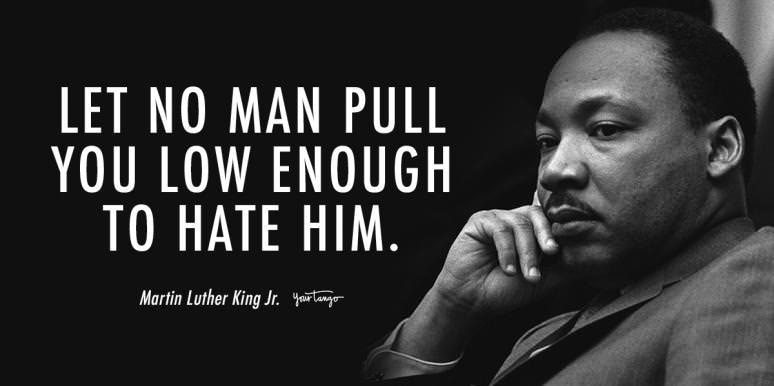
|
|
Martin Luther King Jr. and 40-Days of Peace
In 1967, Martin Luther King, Jr. isolated himself to write his final book, Where Do We Go From Here: Chaos or Community. It would not be published for another ten years. In this salient volume, MLK spoke to his dreams of an America which would explore remedies that would lead to better jobs, just wages, more than adequate health care, homes for all and equal education.
King did not intend for his message to be just for the United States, but it was steeped in hope for a global direction—demanding an end to international suffering and the expectation that common humanity would be able to obtain and live the rights expressed in the 1948 United Nations Declaration for Human Rights. Theologian Cornel West notes, in Where Do We Go From Here, King puts forth his “last grand expression of his vision—he put forward his most prophetic challenge to powers that be and his most progress[ive)]program for the wretched of the earth.”
Martin Luther King was a powerhouse for his time and beyond. He is one of the greatest intellectuals in American history—a man of substance and action. He understood how to bridge the depravities of poverty to the wealth of nations and the struggle for freedom to the core of creating a “beloved community.”
During the past several years the Charter for Compassion has participated in the 40 Days of Peace celebrating the extraordinary grassroots, national and global challenges that MLK has charged us to follow. The programs outlined below refer to “The Triple Evils,” addressed in Where Do We Go From Here.
The Triple Evils of POVERTY, RACISM and MILITARISM are forms of violence that exist in a vicious cycle. They are interrelated, all-inclusive, and stand as barriers to our living in the Beloved Community. When we work to remedy one evil, we affect all evils. To work against the Triple Evils, you must develop a nonviolent frame of mind as described in the “Six Principles of Nonviolence” and use the Kingian model for social action outlined in the “Six Steps for Nonviolent Social Change.”
Six Steps for Nonviolent Social Change
Photo Credit: LeeAnn Cline, unsplash.com
In 1967, Martin Luther King, Jr. isolated himself to write his final book, Where Do We Go From Here: Chaos or Community. It would not be published for another ten years. In this salient volume, MLK spoke to his dreams of an America which would explore remedies that would lead to better jobs, just wages, more than adequate health care, homes for all and equal education.
King did not intend for his message to be just for the United States, but it was steeped in hope for a global direction—demanding an end to international suffering and the expectation that common humanity would be able to obtain and live the rights expressed in the 1948 United Nations Declaration for Human Rights. Theologian Cornel West notes, in Where Do We Go From Here, King puts forth his “last grand expression of his vision—he put forward his most prophetic challenge to powers that be and his most progress[ive)]program for the wretched of the earth.”
Martin Luther King was a powerhouse for his time and beyond. He is one of the greatest intellectuals in American history—a man of substance and action. He understood how to bridge the depravities of poverty to the wealth of nations and the struggle for freedom to the core of creating a “beloved community.”
During the past several years the Charter for Compassion has participated in the 40 Days of Peace celebrating the extraordinary grassroots, national and global challenges that MLK has charged us to follow. The programs outlined below refer to “The Triple Evils,” addressed in Where Do We Go From Here.
The Triple Evils of POVERTY, RACISM and MILITARISM are forms of violence that exist in a vicious cycle. They are interrelated, all-inclusive, and stand as barriers to our living in the Beloved Community. When we work to remedy one evil, we affect all evils. To work against the Triple Evils, you must develop a nonviolent frame of mind as described in the “Six Principles of Nonviolence” and use the Kingian model for social action outlined in the “Six Steps for Nonviolent Social Change.”
Six Steps for Nonviolent Social Change
- Information Gathering. To understand and articulate an issue, problem or injustice facing a person, community, or institution you must do research.
- Education
- Personal Commitment
- Negotiation
- Direct Action.
- Reconciliation
Photo Credit: LeeAnn Cline, unsplash.com
"The principle of compassion lies at the heart of all religious, ethical and spiritual traditions, calling us always to treat all others as we wish to be treated ourselves . . . We urgently need to make compassion a clear, luminous, and dynamic force in our polarized world. Rooted in a principled determination to transcend selfishness, compassion can break down political, dogmatic, ideological and religious boundaries. Born of our deep interdependence, compassion is essential to human relationships and to a fulfilled humanity. It is the path to enlightenment and indispensable to the creation of a just economy and a peaceful global community." Sign and share the Charter for Compassion
Proudly powered by Weebly


